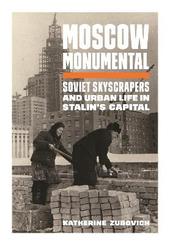
|
Moscow Monumental: Soviet Skyscrapers and Urban Life in Stalin's Capital
Paperback / softback
Main Details
Description
An in-depth history of the Stalinist skyscraper In the early years of the Cold War, the skyline of Moscow was forever transformed by a citywide skyscraper building project. As the steel girders of the monumental towers went up, the centuries-old metropolis was reinvented to embody the greatness of Stalinist society. Moscow Monumental explores how the quintessential architectural works of the late Stalin era fundamentally reshaped daily life in the Soviet capital. Drawing on a wealth of original archival research, Katherine Zubovich examines the decisions and actions of Soviet elites-from top leaders to master architects-and describes the experiences of ordinary Muscovites who found their lives uprooted by the ambitious skyscraper project. She shows how the Stalin-era quest for monumentalism was rooted in the Soviet Union's engagement with Western trends in architecture and planning, and how the skyscrapers required the creation of a vast and complex infrastructure. As laborers flooded into the city, authorities evicted and rehoused tens of thousands of city residents living on the plots selected for development. When completed in the mid-1950s, these seven ornate neoclassical buildings served as elite apartment complexes, luxury hotels, and ministry and university headquarters. Moscow Monumental tells a story that is both local and broadly transnational, taking readers from the streets of interwar Moscow and New York to the marble-clad halls of the bombastic postwar structures that continue to define the Russian capital today.
Author Biography
Katherine Zubovich is assistant professor of history at the University at Buffalo, State University of New York. Twitter @kzubovich
Reviews"Shortlisted for the Pushkin House Russian Book Prize" "Shortlisted for the Best Book in Cultural Studies Prize, American Association of Teachers of Slavic and East European Languages" "One of Foreign Affairs' Best Books" "Impressive detail"---Anthony Paletta, Literary Review "Zubovich has done stellar work in the city's archives, uncovering a trove of letters and petitions from ordinary Soviet citizens. . . This is a book which delves into the very human tensions created by a society forced into transition, and the effects on a city undergoing a seismic political, cultural, and architectural change."---Jennifer Eremeeva, The Moscow Times "A superb, sweeping account of the realization of a magnificent group of skyscrapers. Grounded in meticulous archival research, and highly readable, it will appeal to specialists and general readers alike interested in topics as wide ranging as Soviet-US relations, architecture, intellectuals, and everyday life under Stalin."---Christine Varga-Harris, American Historical Review "Russian and Soviet urban history has expanded and developed greatly in the last two decades by drawing attention to the built environment, lived experience, and aesthetic choices and meanings of buildings. In Katherine Zubovich's Moscow Monumental: Soviet Skyscrapers and Urban Life in Stalin's Capital we have an example of some of the best trends in recent years. "---Karl Qualls, Russian Review "Drawing on extensive archival research, the book delineates an arc from early conceptualization of Moscow as the capital of Soviet Russia to infighting leading to the demise of monumentality as a dominant force in Soviet architecture during the 1950s. ... Recommended." * Choice * "Well researched and lucidly written, Moscow Monumental is a welcome contribution to the field of urban history. It will be a good addition to the reading lists for university courses on Russian social and cultural his tory. It will also be much appreciated by lovers of Russian history outside academe."---Elena V. Baraban, Ab Imperio Quarterly
|